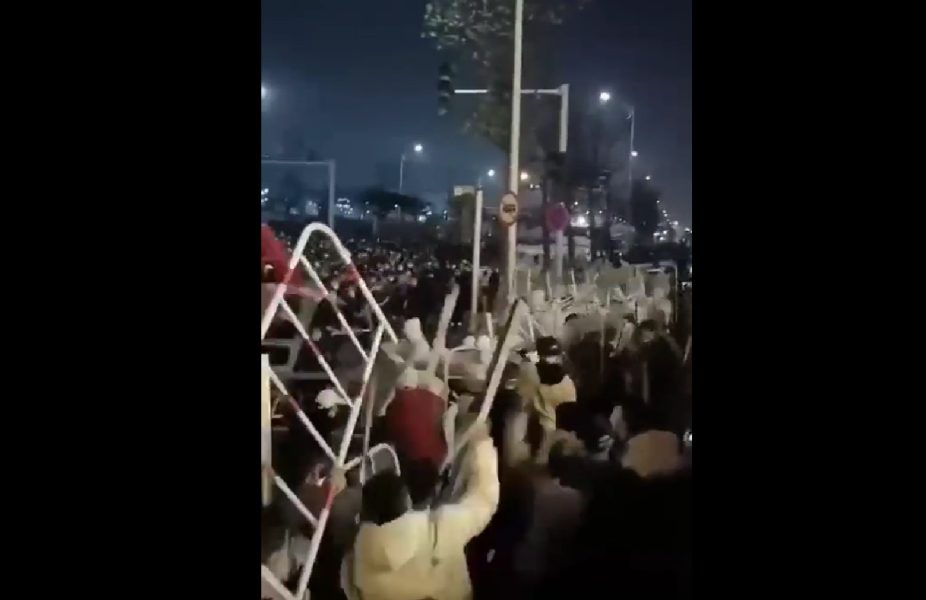
China protests: Police flood streets to quell dissent; authorities slam BBC

The Chinese foreign ministry has accused the BBC of “maliciously playing the victim”, after the UK broadcaster accused China of assaulting and detaining one of its reporters.
The Chinese government condemned the incident, called out the UK government for its “hypocritical double standards”.
The Chinese foreign ministry, on the continued protests in the country, said: “China is a country with rule of law and all rights and freedom of Chinese citizens is protected but they must be exercised within the framework of the law.”
British Foreign Secretary James Cleverly had earlier said that the Chinese government should take notice of the emerging protests. “Protests against the Chinese government are rare and when they do happen, I think the world should take notice, but I think the Chinese government should take notice,” he said.
“It is clear that the Chinese people themselves are deeply unhappy with what is going on, about the restrictions imposed upon them by the Chinese government,” said Cleverly.
Protests pause as the police flood city streets
With the police flooding city streets on Tuesday (November 29), there was no word of additional protests against the strict anti-pandemic measures by the Chinese government.
Also Read: Intense protests rock China, agitators chant ‘anti-Xi’ slogans, show blank paper
Shanghai, Nanjing and other cities, where online calls to gather had been issued, were also reportedly quiet.
The protests in China seems to be fizzling out faster than a wet firecracker
This protest in Guangzhou, you see 5 protesters being scolded by locals, as the police and onlookers enjoy the show
Here's what they said…🧵 pic.twitter.com/ZFyZJ57krk
— Zhao DaShuai 无条件爱国🇨🇳 (@zhao_dashuai) November 29, 2022
Rallies against China’s unusually strict anti-virus measures spread to several cities over the weekend in the biggest show of opposition to the ruling Communist Party in decades.
Authorities eased some regulations, apparently to try to quell public anger, but the government showed no sign of backing down on its larger coronavirus strategy, and analysts expect authorities to quickly silence the dissent.
Hong Kong’s biggest protests in more than a year
In Hong Kong on Monday (November 28), about 50 students from mainland China sang at the Chinese University of Hong Kong and some lit candles in a show of support for those in mainland cities who demonstrated against restrictions that have confined millions to their homes.
Hiding their faces to avoid official retaliation, the students chanted, no PCR tests but freedom! and oppose dictatorship, do not be slaves! The gathering and a similar one elsewhere in Hong Kong, were the biggest protests there in more than a year under rules imposed to crush a pro-democracy movement in the territory, which is Chinese but has a separate legal system from the mainland.
“I have wanted to speak up for a long time, but I did not get the chance to,” said James Cai, a 29-year-old from Shanghai who attended a Hong Kong protest and held up a piece of white paper, a symbol of defiance against the ruling party’s pervasive censorship. “If people in the mainland cannot tolerate it anymore, then I cannot as well.”
Also Read: China’s zero-COVID policy wreaks havoc as cases surge and so do protests
What sparked the protests?
It was not clear how many people have been detained since the protests began in the mainland on Friday, sparked by anger over the deaths of ten people in a fire in the northwestern city of Urumqi.
That prompted angry questions online about whether firefighters or victims trying to escape were blocked by locked doors or other anti-virus controls. Authorities denied that, but the incident became a target for public frustration about the controls.
Ease in restrictions
Without mentioning the protests, the criticism of Xi or the fire, some local authorities eased restrictions on Monday.
The city government of Beijing announced it would no longer set up gates to block access to apartment compounds where infections are found. Passages must remain clear for medical transportation, emergency escapes and rescues, said Wang Daguang, a city official in charge of epidemic control, according to the official China News Service.
Guangzhou, a manufacturing and trade center that is the biggest hot spot in China’s latest wave of infections, announced some residents would no longer be required to undergo mass testing.
Urumqi and another city in the Xinjiang region in the northwest, announced that markets and other businesses in areas deemed at low risk of infection would reopen this week and public bus service would resume.
Also Read: Fire that killed 10 kindles anti-COVID lockdown protests in China’s Shanghai
The U.S. Embassy advised citizens to prepare for all eventualities and said Ambassador Nicholas Burns and other American diplomats have regularly raised our concerns on many of these issues directly.
“We encourage all U.S. citizens to keep a 14-day supply of medications, bottled water, and food for yourself and any members of your household,” the Embassy said in a statement on Monday.
Support peaceful protests: White House
In Washington, the White House National Security Council spokesman John Kirby, said that obviously, there are people in China who have concerns regarding the lockdowns, are protesting. “We believe that they should be able to do that peacefully,” said Kirby at a Monday briefing.
(With inputs from agencies)

